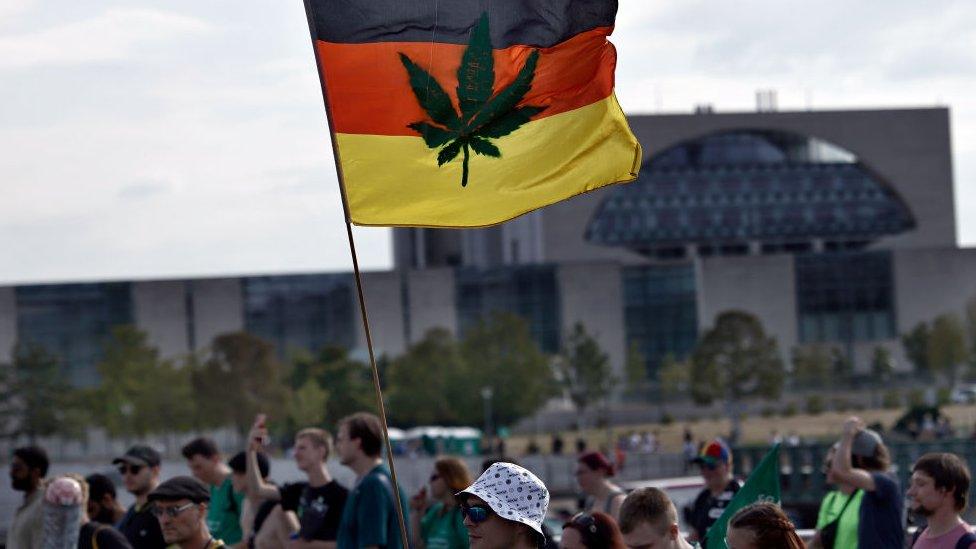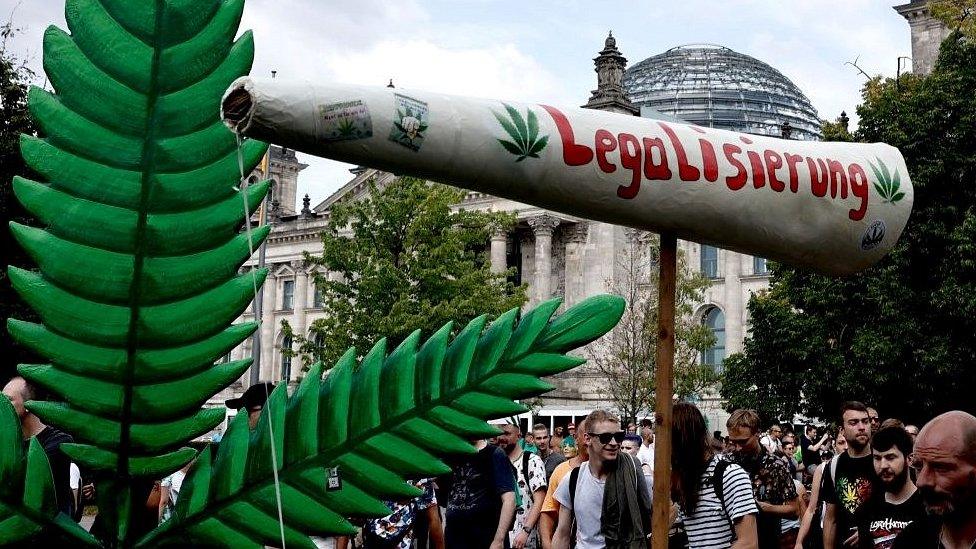Cannabis clubs plan dilutes German drugs reforms
- Published

Germany's ruling coalition aims to decriminalise possession of 25g of cannabis, enough for dozens of joints
Marijuana farms popping up all over Germany and joints served with coffee in Amsterdam-style cafes was what some voters imagined.
The government's final bill on legalising cannabis is less dramatic.
Instead, the drug will be grown and sold in state-controlled non-profit "cannabis social clubs".
Registered members will be able to buy a limited amount. Then the government plans to test the drug's sale in licensed stores in some regions.
People will also be able to grow their own marijuana, but only three plants per person will be allowed.
Ministers say they were restricted by EU rules that oblige member states to fight the drug trade. The end result is, like many things in Germany, a complicated compromise.
But it's still a big step. Possession of up to 25g of cannabis for personal use will be legal, a not insignificant amount that would be enough for dozens of joints.
Conservative opposition politicians say any form of drug liberalisation is dangerous. Bavarian Premier Markus Söder tweeted that legalising drugs was "simply the wrong path to go down" and that setting up "drug clubs" did not solve any problems but created new ones.
The aim of the reforms is to put drug dealers out of business, prevent the consumption of cannabis cut with harmful chemicals and to stop the resource-wasting criminalisation of people who smoke small amounts.
But perhaps the most important thing about this move is the political signal it sends - a rare moment of agreement in a rocky left-Green-liberal governing coalition that is often perceived as disunited, argumentative and unable to push through its key policies.
When it came to power in 2021, after 16 years of Angela Merkel's conservative-led government, the new coalition promised a younger, funkier, more liberal Germany.
Some new ministers were a generation younger than the outgoing cabinet. They took selfies after meetings and pledged faster internet, greener energy and more LGBTQ rights.
The headline-grabbing pledge to legalise marijuana was part of this progressive agenda to shake up post-Merkel Germany. In interviews some ministers embarrassingly started using the slang word "Bubatz" that young Germans have for cannabis.
A few months in power and their priorities changed overnight, when Russia launched its full-scale invasion of Ukraine. There was an unprecedented boost in military spending and a complete cut in Russian energy and trade links.
Given the challenges, Germany has coped remarkably well. The economy is stable and the feared energy shortages never happened. But at a political cost.
Parties have jettisoned core ideological beliefs on the environment, budget rules or weapons exports, and some voters and party members feel betrayed.
The multiple crises sparked by the war have exacerbated tensions between the three coalition partners, particularly the Greens and the pro-business liberal FDP. Both parties are ideologically opposed on key issues, from nuclear power to transport. Each fresh row between ministers pushes the coalition's poll numbers further down.
Legalising cannabis is one of the few areas of agreement for three parties that like to see themselves as progressive.
But that does not mean provincial German towns will be turning into Amsterdam anytime soon.
Health Minster Karl Lauterbach said the government had focused closely on the neighbouring Dutch model but, with an eye to its large black market and cannabis cafe culture, more as an example of what not to do.
Related topics
- Published26 October 2022
